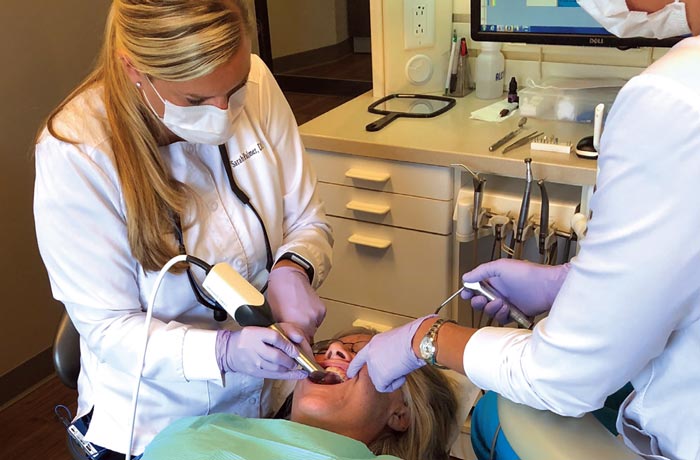Discover Constant Dental Issues Your Dental Practitioner Can Settle
Comprehending constant dental issues is vital for preserving ideal dental health. Issues such as dental caries, gum tissue illness, tooth sensitivity, foul-smelling breath, and dental cavity prevail yet usually neglected up until they come to be extreme. Dental professionals have the experience to diagnose and treat these conditions, thus avoiding more difficulties. Regular dental brows through and personalized treatment plans can deal with these problems efficiently, making certain a much healthier and brighter smile. What details treatments do dental experts employ to deal with these problems, and how can early intervention make a difference? The solution to these questions use valuable understandings into securing your oral health.
Tooth Cavities
Tooth cavities, also called tooth decays, are a prevalent oral health problem brought on by the demineralization of tooth enamel as a result of acid manufacturing from bacterial plaque. This procedure starts when microorganisms in the mouth metabolize sugars and starches from food, creating acids that erode the enamel. If not attended to promptly, this disintegration can penetrate deeper right into the tooth, influencing the dentin and eventually the pulp, possibly bring about severe pain and infection.
The beginning of tooth cavity development commonly present as white spots on the tooth surface, showing first demineralization. As the procedure proceeds, these areas can become brown or black sores, symbolizing extra comprehensive decay. Regular dental check-ups are vital for very early detection, as dental caries in their inceptive phases can be treated with remineralization strategies, such as fluoride therapies.
Once a tooth cavity has created, corrective intervention is needed. Dental professionals typically eliminate the decayed portion of the tooth and fill up the cavity with materials such as composite resin, amalgam, or ceramic. In much more severe situations, a crown or origin canal therapy may be needed. Safety nets, consisting of excellent oral hygiene practices and dietary alterations, play a crucial function in minimizing the danger of dental caries.
Gum Tissue Condition
While tooth cavities represent a substantial worry for oral health and wellness, another important problem that requires interest is periodontal illness. Additionally referred to as periodontal condition, gum illness is an inflammatory condition impacting the tissues bordering and sustaining the teeth. It is mostly triggered by the build-up of plaque-- a sticky film of bacteria that develops on teeth.
Periodontal disease proceeds via stages, starting with gingivitis, identified by redness, swelling, and hemorrhaging gum tissues (dentist eugene oregon). If left unattended, gingivitis can escalate to periodontitis, where the internal layer of the periodontal and bone draw away from the teeth, developing pockets that end up being contaminated. In time, the contaminants produced by the microorganisms break down the bone and connective tissue that hold teeth in area, potentially bring about tooth loss
Early discovery and therapy are critical. Professional dental cleanings and boosted dental hygiene techniques, such as brushing two times day-to-day and flossing, can manage gingivitis. For even more innovative stages, treatments may consist of scaling and root planing, prescription antibiotics, and even medical treatments.
Normal dental examinations play a critical role in handling and protecting against gum illness. Dental professionals can determine early indicators and recommend suitable interventions, making sure the maintenance of healthy and balanced periodontals and overall oral health.
Tooth Sensitivity
Tooth level of sensitivity impacts countless individuals worldwide, providing a typical yet often distressing dental concern. This condition occurs when the enamel, the outermost safety layer of the teeth, is jeopardized, exposing the underlying dentin. click for source The dentin includes microscopic tubules that lead straight to the oral pulp, where nerves reside. When revealed to stimuli such as hot, chilly, wonderful, or acidic substances, these nerves are activated, triggering sharp pain or pain.
Several elements add to enamel disintegration and succeeding tooth sensitivity, including aggressive brushing, acidic foods and drinks, periodontal economic crisis, and bruxism (teeth grinding) Additionally, dental treatments such as teeth whitening can briefly increase sensitivity.
Bad Breath
One click here now more widespread oral worry that influences people' daily lives is poor breath, medically described bad breath. Halitosis frequently originates from poor oral hygiene, which allows food particles to continue to be in the mouth, cultivating bacterial growth.
:max_bytes(150000):strip_icc()/HowMuchDoesDentalWorkCostWithoutInsurance-46a157f20bd442cab4544b18577120ab.jpg)
Referrals might involve enhancing oral hygiene techniques, such as routine cleaning and flossing, making use of antibacterial mouthwashes, staying hydrated, and attending to any type of oral problems. Efficient monitoring of halitosis not just enhances dental health yet additionally dramatically improves high quality of life.
Tooth Decay

Stopping dental caries involves a combination of good dental health practices and normal dental examinations. Brushing teeth a minimum of twice daily with fluoride toothpaste, flossing to remove plaque between teeth, and limiting the consumption of sugary foods and drinks are vital safety nets. news Fluoride therapies, oral sealers, and expert cleansings offered by a dentist can likewise play a significant role in fortifying enamel and preventing degeneration.
Dentists can eliminate corroded tissue and bring back the tooth with fillings made from products such as composite resin, amalgam, or porcelain. By attending to tooth degeneration without delay, dental experts help protect dental framework and function, guaranteeing lasting dental wellness.
Final Thought
Dealing with typical oral problems such as cavities, periodontal disease, tooth level of sensitivity, foul-smelling breath, and tooth degeneration is vital for keeping optimum dental wellness and general health. Dental experts possess the know-how to identify and treat these problems effectively, guaranteeing tailored care for each client. Routine preventative procedures and oral check-ups are vital in recognizing and managing these concerns early, advertising a much healthier and much more confident smile over a life time.

Tooth degeneration, also understood as dental cavities, occurs when the enamel, the outermost layer of the tooth, is worn down by acids produced by germs in the mouth. Cleaning teeth at least two times daily with fluoride toothpaste, flossing to eliminate plaque in between teeth, and limiting the intake of sugary foods and drinks are crucial preventative measures.Attending to usual oral problems such as dental caries, gum illness, tooth sensitivity, bad breath, and tooth decay is essential for preserving optimum dental health and wellness and total well-being.